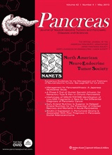
Journal of Pancreatology
Scope & Guideline
Connecting global researchers to enhance pancreatic knowledge.
Introduction
Aims and Scopes
- Pancreatic Cancer Research:
The journal emphasizes the molecular, genetic, and clinical aspects of pancreatic cancer, including novel biomarkers, treatment responses, and therapeutic strategies. - Chronic and Acute Pancreatitis Studies:
It covers investigations into the pathogenesis, clinical management, and complications of pancreatitis, aiming to improve patient outcomes through enhanced understanding and innovative treatments. - Neuroendocrine Tumor Insights:
The journal features research on pancreatic neuroendocrine tumors, focusing on their diagnosis, treatment options, and prognostic factors. - Innovative Therapeutic Approaches:
There is a consistent focus on emerging therapies, including novel chemotherapeutic agents, targeted therapies, and interventional techniques. - Translational Research and Clinical Guidelines:
The journal aims to bridge the gap between laboratory research and clinical practice, providing evidence-based guidelines and consensus statements for the management of pancreatic diseases. - Interdisciplinary Collaborations:
It encourages interdisciplinary research involving surgery, radiology, oncology, and molecular biology to enhance the understanding and treatment of pancreatic conditions.
Trending and Emerging
- Molecular and Genetic Biomarkers:
There is an increasing focus on identifying and validating molecular and genetic biomarkers that can predict treatment responses and prognoses in pancreatic cancer, enhancing personalized medicine approaches. - Interventional and Minimally Invasive Techniques:
Emerging themes include the exploration of interventional therapies, such as targeted drug delivery systems and minimally invasive surgical options, which are gaining traction for their potential to improve patient outcomes. - Role of the Microbiome:
Research investigating the role of gut microbiota in pancreatic diseases, particularly in acute pancreatitis, is on the rise, reflecting a broader interest in the microbiome's influence on health and disease. - Artificial Intelligence and Machine Learning:
There is a growing trend towards integrating artificial intelligence and machine learning in pancreatic cancer diagnosis, treatment planning, and outcome prediction, highlighting the technological advancements in healthcare. - Immunotherapy and Immune Microenvironment:
Emerging studies are increasingly focusing on the immune landscape of pancreatic tumors, exploring immunotherapy options and the tumor microenvironment's role in disease progression and treatment efficacy.
Declining or Waning
- Traditional Surgical Techniques:
There has been a noticeable decrease in the number of studies focusing on conventional surgical techniques for pancreatic conditions, indicating a shift towards minimally invasive and robotic-assisted approaches. - Generalized Case Reports:
The frequency of generic case reports without substantial novel insights or broad implications has diminished, as the journal appears to prioritize studies with significant clinical or scientific contributions. - Natural Remedies and Alternative Treatments:
There seems to be a waning interest in studies exploring natural remedies for pancreatic diseases, suggesting a move towards more evidence-based and scientifically validated treatment approaches. - Basic Pathophysiological Studies:
Research focusing solely on basic pathophysiological mechanisms without direct clinical relevance is less frequently published, reflecting a trend towards applied research that offers immediate clinical benefits.
Similar Journals

Austrian Journal of Clinical Endocrinology and Metabolism
Fostering collaboration in endocrinology and metabolism.Austrian Journal of Clinical Endocrinology and Metabolism, published by SPRINGER WIEN, serves as a pivotal platform for the dissemination of research in the field of endocrinology, diabetes, and metabolism. With its ISSN 1998-7773 and E-ISSN 1998-7781, this journal has been contributing valuable insights to the field since its inception in 2010. Although it currently holds a Q4 ranking in the category of Endocrinology, Diabetes and Metabolism, it is committed to improving its impact factor by showcasing high-quality, peer-reviewed articles that reflect contemporary challenges and innovations in clinical endocrinology. Located in Vienna, Austria, the journal aims to provide researchers, healthcare professionals, and students with access to the latest findings and clinical practices that advance understanding and treatment of endocrine disorders. Researchers interested in submitting their work will find a supportive environment that embraces both experimental and clinical approaches. The Austrian Journal of Clinical Endocrinology and Metabolism is poised to become a valuable resource for those dedicated to improving health outcomes in metabolic disorders.

Turkish Journal of Endocrinology and Metabolism
Exploring New Frontiers in Endocrinology and Metabolic DisordersThe Turkish Journal of Endocrinology and Metabolism, published by AVES, is a prominent platform dedicated to advancing research in the fields of endocrinology, diabetes, and metabolism. As an Open Access journal since 2002, it provides unrestricted access to its content, fostering a global exchange of knowledge among researchers, clinicians, and students. Operating from Turkey, this journal plays a crucial role in disseminating innovative findings related to endocrine disorders and metabolic diseases. While its current Q4 quartile rankings in both Endocrinology and Internal Medicine underscore areas for growth, they also signify the journal’s commitment to enhancing its impact within these disciplines. The journal emphasizes the development of locally relevant research while encouraging international contributions, thus bridging gaps in global health discourse. Engage with cutting-edge research that shapes clinical practices and informs public health policies by submitting your work or exploring the journal’s vast archive from 2009 to 2023.

United European Gastroenterology Journal
Transforming insights into impactful healthcare solutions.The United European Gastroenterology Journal, published by John Wiley & Sons Ltd, is a leading publication in the fields of gastroenterology and oncology, boasting a distinguished Q1 ranking in both categories for 2023. With an ISSN of 2050-6406 and an E-ISSN of 2050-6414, this journal serves as a vital platform for disseminating cutting-edge research and innovative practices from 2013 to 2024, supporting the advancement of knowledge in gastrointestinal health and cancer treatment. With a commendable Scopus Rank of 14th out of 167 in gastroenterology and 54th out of 404 in oncology, it emphasizes the significance of impactful research in these critical areas. While currently not an open-access journal, it remains a vital resource for researchers, professionals, and students seeking comprehensive insights and evidence-based approaches to improve patient care and clinical outcomes. The United European Gastroenterology Journal is committed to bridging the gap between research and practice, making it an essential reference for those dedicated to the fields of gastroenterology and oncology.

JOURNAL OF ENDOCRINOLOGY
Exploring Innovations in Diabetes and MetabolismJOURNAL OF ENDOCRINOLOGY, established in 1946 and published by BIOSCIENTIFICA LTD, stands as a premier scholarly outlet in the field of endocrinology, diabetes, and metabolism. With an impressive H-Index reflecting its significant contribution to the literature, this journal maintains a strong presence in academic circles, evidenced by its Q1 ranking in the 2023 Scopus categories for both Endocrinology and Diabetes and Metabolism. With its targeted scope serving a global audience of researchers, professionals, and students, it provides a vital platform for disseminating innovative research findings and advancing the scientific understanding of endocrine systems. As we approach its convergence year of 2024, JOURNAL OF ENDOCRINOLOGY remains committed to publishing high-quality, peer-reviewed articles that explore cutting-edge developments in the field, thereby impacting clinical practices and guiding future research directions.

Annals of Hepato-Biliary-Pancreatic Surgery
Transforming Insights into Surgical MasteryAnnals of Hepato-Biliary-Pancreatic Surgery is a leading academic journal dedicated to the fields of hepatobiliary and pancreatic surgery, contributing essential research and clinical insights to enhance surgical practices and patient outcomes. Published by the Korean Association of Hepato-Biliary-Pancreatic Surgery (KAHBPS), this journal serves as a vital resource for researchers, clinicians, and healthcare professionals interested in the latest advancements and methodologies within this specialized area. With an ISSN of 2508-5778 and an E-ISSN of 2508-5859, the journal presents a platform for high-quality, peer-reviewed articles that focus on the management and surgical techniques for liver, biliary, and pancreatic disorders. Although it currently offers limited open access options, the journal has been recognized in the 2023 Scopus Ranks, reflecting its influence in the medical community, particularly with a Q3 designation in Gastroenterology and Surgery. By fostering academic dialogue, the Annals of Hepato-Biliary-Pancreatic Surgery plays a crucial role in shaping evidence-based practice, making it indispensable for those engaged in this dynamic and evolving field.

PANCREAS
Delivering high-quality research for a thriving medical community.PANCREAS, published by Lippincott Williams & Wilkins, is a preeminent journal dedicated to advancing the field of endocrinology, diabetes, hepatology, and internal medicine. With an ISSN of 0885-3177 and E-ISSN of 1536-4828, this journal aims to disseminate high-quality research findings and clinical insights that are pivotal for professionals in these areas. The journal has established itself with an impressive Q2 ranking across multiple categories in the 2023 rankings, including endocrinology, diabetes and metabolism, hepatology, and internal medicine. Although it offers no open access options, the content is meticulously curated to enrich the knowledge base of researchers and practitioners. The Scopus rankings further underscore its influence, ranking #64 in Internal Medicine and #36 in Hepatology, reflecting its commitment to scholarly excellence. Based in the United States at Two Commerce Square, 2001 Market St, Philadelphia, PA 19103, PANCREAS serves as a central hub for innovative research from 1986 to 2024, making it an essential resource for those engaged in these rapidly evolving fields.

JOURNAL OF CLINICAL ENDOCRINOLOGY & METABOLISM
Elevating Clinical Standards Through Rigorous ResearchJOURNAL OF CLINICAL ENDOCRINOLOGY & METABOLISM, published by the Endocrine Society, stands as a premier academic journal within the field of endocrinology, diabetes, and metabolism. With a legacy spanning from 1941 to 2024, this journal is distinguished by its significant impact factor, ranking in the Q1 category across multiple related disciplines including biochemistry, clinical biochemistry, and medicine. This esteemed journal, ISSN 0021-972X and E-ISSN 1945-7197, is backed by rigorous peer review, ensuring the publication of high-quality research that contributes to the advancement of clinical practices and scientific knowledge. With a commendable Scopus ranking, positioned in the top percentile of multiple categories, JOURNAL OF CLINICAL ENDOCRINOLOGY & METABOLISM serves as an essential resource for researchers, professionals, and students who seek to stay informed about the latest findings and innovations in endocrine research. The journal enriches the existing body of knowledge and fosters discussion among scholars and practitioners alike, solidifying its crucial role in the ongoing discourse in endocrinology and metabolic health.

Journal of the Pancreas
Empowering clinicians with cutting-edge pancreatic insights.Journal of the Pancreas is a pivotal academic publication dedicated to advancing our understanding of pancreatic diseases and disorders. Published by E S Burioni Ricerche Bibliografiche, this journal aims to disseminate novel research findings, case studies, and reviews pertaining to the diagnosis, treatment, and management of pancreatic conditions. With its ISSN 1590-8577, the journal has made significant contributions to the medical field since its inception in 2000, although it ceased its coverage in Scopus in 2015. The Journal of the Pancreas is particularly valuable for researchers, healthcare professionals, and students in gastroenterology and related fields, as it supports evidence-based practices and promotes collaboration in the exploration of pancreatic health. The importance of this journal is underscored by its commitment to providing high-quality, peer-reviewed research that informs clinical approaches and enhances patient outcomes.

Molecular and Clinical Oncology
Transforming insights into impactful oncology practices.Molecular and Clinical Oncology is a dynamic journal published by SPANDIDOS PUBL LTD, aimed at advancing the understanding of cancer biology and treatment modalities. With an ISSN of 2049-9450 and an E-ISSN of 2049-9469, the journal serves as a critical platform for researchers and clinicians dedicated to uncovering novel insights in molecular oncology and enhancing clinical practices. As a testament to its growing influence, the journal has achieved a Q3 ranking in Oncology and a Q4 ranking in Cancer Research for the year 2023, reflecting its commitment to publishing high-quality research. Although currently not an Open Access publication, the journal offers crucial subscription options, ensuring comprehensive access to groundbreaking studies and innovations in the field. With converged years spanning 2018 to 2024, the journal is set to continue enriching the academic community with its valuable contributions, ultimately empowering researchers, professionals, and students engaged in the fight against cancer.

EUROPEAN JOURNAL OF ENDOCRINOLOGY
Innovative Insights into Hormonal Health and DiseaseEUROPEAN JOURNAL OF ENDOCRINOLOGY, published by Oxford University Press, stands as a premier international platform dedicated to advancing research in the burgeoning field of endocrinology, diabetes, and metabolism. Since its inception in 1994, this esteemed journal has gained recognition for its rigorous peer-reviewed articles and innovative studies, evidenced by its impressive Q1 rankings across multiple categories, including Endocrinology and Medicine. With a focus on disseminating critical findings and fostering interdisciplinary collaboration, the journal ranks 33rd out of 244 in Endocrinology, Diabetes, and Metabolism, and 20th out of 128 in Biochemistry, Genetics, and Molecular Biology according to Scopus metrics, positioning it in the top percentiles for researchers worldwide. Although it does not offer open access, the journal remains a vital resource for academics and practitioners alike who seek to stay at the forefront of endocrine research. The EUROPEAN JOURNAL OF ENDOCRINOLOGY continues to push the boundaries of knowledge, driving forward the understanding of complex hormonal functions and their clinical implications.